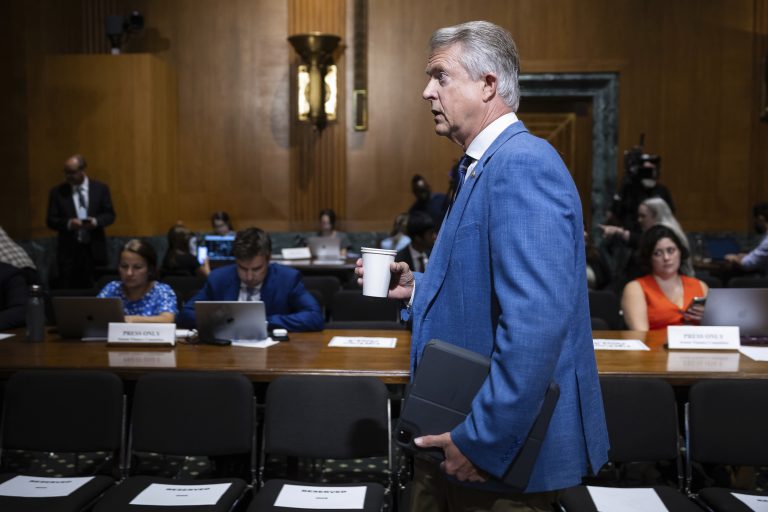The top aide to Sen. Roger Marshall of Kansas charged $44,000 to taxpayers over the past two years in commuting expenses between Washington and Lynchburg, Virginia, where he lives, according to public records.
The reimbursements paid to Brent Robertson are legal and comply with congressional rules governing expense reimbursements, according to experts who reviewed his arrangement, but they also said it was highly unusual and at odds with the intent behind those rules. Typically senior congressional aides are stationed either in Washington or their employer’s home state.
Not so for Robertson, Marshall’s longtime chief of staff, who bought a home about 190 miles from Washington in March 2024.
Between April of that year and the following September, he took 11 trips labeled “Lynchburg VA to Washington DC and Return” and got $16,000 back in expenses from the government, according to Senate expense records. The expenses covered “incidentals,” “transportation” and a “per diem,” which is not usually taxed.
Between October of last year and this past March, Robertson took 15 trips with the same label and got an additional $28,000 in expenses back. He secured a per diem payment of $10,000 for one trip to D.C. between Jan. 14 and Jan. 23, coinciding with the presidential inauguration.
Stanley Brand, an attorney who served as House general counsel under Speaker Tip O’Neill, said it appeared to be “a big, wide loophole” and said he had “never” heard of a similar arrangement.
“What if everybody decided to do that, let their staff live far away from their location, and then just charge it off to the government?” Brand said after reviewing the arrangement at POLITICO’s request.
Robertson declined to comment. Neither Marshall’s office or other experts, including a Senate Democratic aide familiar with official reimbursements, could point to another case where a senior congressional staffer lived outside the Washington area or their employer’s home state and expensed travel costs in this way.
Payton Fuller, a spokesperson for Marshall, said the senator is permitted under Senate rules to designate a remote duty station for his employees, which would allow them to expense work trips to Washington. Marshall’s office shared documentation showing Robertson changing his duty station to Lynchburg before charging the trip expenses.
“After a gang shooting struck his wife’s vehicle outside their D.C. condo, Brent and his family made the decision last year to move to Virginia,” Fuller said in a statement. “Like dozens of other chiefs of staff who have duty stations outside of D.C., and in full accordance and approval of Senate ethics, rules, and guidelines, Brent is reimbursed for official travel to and from his home and duty station in Virginia.”
She declined to comment when asked whether Robertson, who is separately on track to earn more than $220,000 in salary this year, intends to keep charging regular travel to and from his Virginia home to Marshall’s official expense account.
The Republican and Democratic spokespeople for the Senate Rules and Administration Committee, which oversees the chamber’s personnel practices, declined to comment.
Dylan Hedtler-Gaudette, interim vice president of policy and government affairs at the nonprofit watchdog group Project on Government Oversight, questioned the arrangement after being briefed on the expenses. Robertson’s use of official funds, he said in an interview, “appears as though it’s purely personal, which is not what those funds are supposed to be used for.”
Senate expense rules prohibit spending taxpayer funds for personal use, and Hedtler-Gaudette said the expenses “violate the spirit” of those guidelines. “It would be one thing if he was traveling to Kansas because that’s the state that his boss is the senator from,” he said.
He also raised the concern that arrangements like Robertson’s, that “stretch the definition of what a duty station is and encompass the personal home of every staffer,” could proliferate.
Robertson’s expenses were paid out of Marshall’s Official Personnel and Office Expense Account, a $4 million annual allowance that encompasses staff salaries, representational costs and other office expenses. Marshall has spoken out against federal employees doing remote work and sponsored legislation to curtail the practice.
“I want to make it clear, I’m against teleworking from home,” he said last year. “I’m just against it overall at the government level.”
Robertson’s decision to live in Lynchburg and seek travel expenses back and forth is further complicated by the fact that he continued to own a Washington condo that he claimed as his primary residence until it was sold in May, according to D.C. property tax records. Publicly available copies of his tax bill show that lowered his property tax bills by hundreds of dollars during the period he was claiming travel expenses to and from Lynchburg.
After POLITICO inquired about Robertson claiming a “homestead” tax deduction, Fuller said a “delay in processing” led to the error and that the “issue has been resolved.” Robertson, she said, recently paid about $700 in back taxes and fees owed to the D.C. government.

